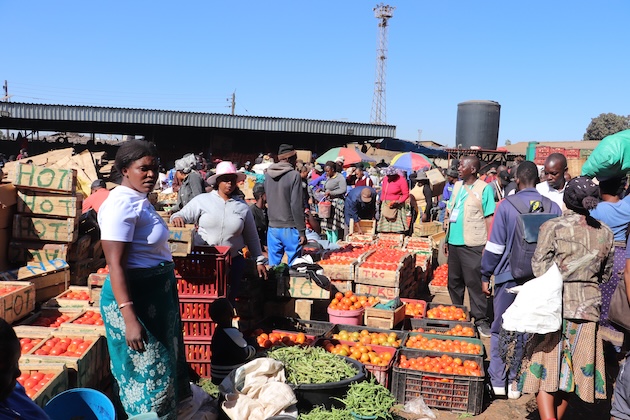HARARE, Oct 4 (IPS) – African policymakers, local leaders and the private sector have been asked to create an enabling environment that will help African traders and farmers build reliable systems for food security and resilience through territorial markets.
At a 2024 African Agroecological Entrepreneurship and Seed Festival in Harare, Zimbabwe, experts noted that ongoing crises have shown the importance of resilient ‘territorial’ markets close to home that feed billions of people every day – from public markets and street markets. from vendors to cooperatives, from urban farming to direct online sales, and from food hubs to community kitchens.
“Following Russia’s invasion of Ukraine, for example, global food prices rose by 15 percent, forcing policymakers around the world to consider how to reduce dependence on volatile global markets and strengthen food self-sufficiency,” said Dr. General Coordinator at the Alliance for Food Sovereignty in Africa (AFSA).
“Furthermore, questions have been raised about how people are actually fed and by whom, prompting us to ask: what types of food supply chains and markets can build resilience in this century of crisis and help fulfill the right to food – by people around us to feed? make the world more sustainable and just?” Belay asked.
To answer this question, experts are calling for policies and healthy working environments that strengthen territorial markets that promote nutritional diversity and affordable nutritious food for all, empower producers and food workers to maintain control over their livelihoods, and produce food that is adaptable to shocks in climate change and emerging crises.
These markets are broadly defined as those that target small-scale agroecological food producers and business owners who produce and sell a variety of commodities, often meeting the preferences of the majority of farmers, traders and consumers.
Studies have shown that these markets play a crucial role in making food accessible and affordable, especially for low-income populations in the Global South, facilitating the purchase of small and flexible quantities of food, price negotiations, informal credit agreements and the ability to be localized are possible. in or near low-income neighborhoods.
However, a new study launched on the sidelines of the Harare event culminating in the fifth biennial Africa Food Systems Conference shows that profit-oriented corporate value chains are heavily concentrated in African markets.
The report, titled ‘Food from Somewhere’, by the International Panel of Experts on Sustainable Food Systems (IPES Food)notes that just seven grain traders control at least 50 percent of global grain trade, six major companies control 78 percent of the agrochemical market, the eight largest freight forwarders control more than 80 percent of the ocean freight capacity market, and 1 percent of the world’s largest farms the world owns 70 percent of the world’s agricultural land.
According to experts, this amounts to a corporate conquest of Africa’s food systems.
The report therefore calls for a paradigm shift and urges governments to reinvest in local and regional supply infrastructure, relocalize public procurement and develop food security strategies for a more resilient and equitable approach to food security.
‘The problem for small farmers is not that they are connected to markets (most are already involved in markets), but rather the conditions of their access and the rules and logic by which markets function – who sets prices and based on what criteria , who controls the costs of production, who, among other things, has market power,” says Mamadou Goïta, member of IPES and lead author.
A sample of the Mbare Musika territorial market in Harare found a variety of foodstuffs sourced from all eight regions of Zimbabwe, including from neighboring countries, such as apples and other fruits from South Africa, fish and ginger from Mozambique, groundnuts from Malawi, sorghum from Botswana, but also grapes from Egypt and tamarind from Tanzania, among others.
“This is the central hub for smallholder farmers and traders, supporting over seven million people from across Zimbabwe and other parts of the continent,” said Charles Dhewa, Chief Executive Officer. Knowledge Transfer Africa (KTA)whose flagship project is known as eMkambo (eMarket) is to create a physical and web-based market for agriculture and rural development, integrating the use of mobile phones and the Internet to create, adapt and share knowledge.
The Mbare Musika market, on the outskirts of Harare, is located next to the main bus park, where food is brought in using informal means such as passenger buses and vans from different parts of the country, in small and large quantities. and of different varieties and qualities.
“The evidence is clear: localized food systems are critical to feeding an increasingly hungry planet and preventing food insecurity and famine,” said Shalmali Guttal, executive director of Focus on the Global South. “They provide nutritious, affordable food and are much more adaptable to global shocks and disruptions than industrial supply chains,” she added.
Jennifer Clapp, professor and Canada Research Chair in Global Food Security and Sustainability at the University of Waterloo, Canada, pointed out that in this era of increasing hunger and environmental fragility, global industrial food chains will collapse catastrophically under the pressure of climate change. frequent crises.
“To have a chance of reaching the world hunger neutrality goal by 2030, we must reimagine our food systems and strengthen the food markets that serve the poor,” she said.
IPS UN agency report
Follow @IPSNewsUNBureau
Follow IPS News UN Bureau on Instagram
© Inter Press Service (2024) — All rights reservedOriginal source: Inter Press Service

